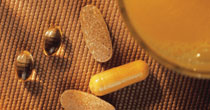The Rediscovered
Vitamin © 2010
by Joe Smulevitz, CH, MH

There are different forms of vitamin K, but not all forms are equal in directing calcium to the bone and away from the arterial wall.
A vitamin forgotten for decades has been rediscovered, gaining the attention of scientists for its role in arterial and bone health. Vitamin K, long known as a blood-clotting agent, is proving to be much more than a coagulation vitamin. Researchers have uncovered several vitamin K-dependent proteins—matrix Gla-protein and osteocalcin—as being essential for the utilization of calcium in the body. Adequate vitamin K intake is necessary to activate these proteins that enable calcium to be carried to bone and away from the arteries where it can be dangerous. Matrix Gla-protein, present in bone tissue and vascular walls, guards against arterial calcification by blocking the formation of crystals by the calcium that circulates in the blood. Bone-building cells called osteoblasts produce the protein osteocalcin that helps the body hold and bind calcium in place in the bones. Without sufficient vitamin K available to activate this protein, large amounts of inactive osteocalcin will flow in the bloodstream.
There are different forms of vitamin K, but not all forms are equal in directing calcium to the bone and away from the arterial wall. Vitamin K1, or phylloquinone, is the natural form found in plants such as leafy green vegetables. This form of vitamin K has a limited life and only a small fraction is absorbed in the bloodstream. Vitamin K3, or menadione, is a synthetic derivative that is toxic. Its use has been limited to treating aggressive cancers. The form of vitamin K best absorbed by the body and that plays a major role in regulating calcium is vitamin K2. Its name is the collective term for a group of vitamin K molecules called menaquinones. Two active forms of K2 (MK-4 and MK-7) have the backing of extensive research that has led to their growing reputation in bone and heart health. The MK-4 form produces a rapid increase in vitamin K blood levels and is being used in Japan to support healthy bone density. The MK-7 form of vitamin K2 is recognized in scientific literature for being longer-lasting and is better absorbed by the human body. Food sources of vitamin K2 include organ meats, egg yolks, and cheese, all of which should not be consumed in excess. The Japanese dish natto, a popular fermented soy product, is a particularly rich source of the long-lasting MK-7 form of vitamin K2. However, the taste is unpalatable to most people in the Western world.
Supplements afford another alternative for obtaining vitamin K2. Look for supplements offering a higher dose of vitamin K then the current recommended daily intake of 90 micrograms (mcg) per day for adult woman and 120 micrograms per day for adult men. These amounts are based on the body’s need for normal blood clotting. Published studies show that much higher levels of vitamin K are needed for optimal bone and heart benefits. Some researchers believe the ideal daily intake of vitamin K should consist of 1,000 mcg of vitamin K1, 1000 mcg of MK-4, and 100 mcg of the more potent MK-7 derived from natto beans. WARNING: Heart patients and persons prescribed anticoagulants (a substance that prevents blood clotting) should consult with their physician prior to initiating any form of vitamin K supplementation.
Here is a rundown of important vitamin K studies in the human population that show a strong connection between bone health, coronary heart disease, and intake of vitamin K.
Journal Nutrition, Metabolism & Cardiovascular Diseases, January, 2009. A study of over 16,000 women aged 49-70 years showed an increased intake of vitamin K2 strongly reduced their risk of coronary heart disease. None of the women had cardiovascular disease prior to the study that covered an 8-year period.
The Journal of Nutrition, November, 2004. The Rotterdam Heart Study: Nearly 5,000 subjects were tracked for seven years. Follow-up data showed that participants with the highest vitamin K2 consumption (about 45 mcg daily) had a nearly 50% reduction in arterial calcification and death related to coronary heart disease, compared to people with the lowest (approx. 12 mcg daily) intake of vitamin K2. There was no benefit with vitamin K1.
American Journal of Clinical Nutrition, May, 2000. Framingham Heart Study: A seven-year study covered nearly 900 elderly men and women. Participants with the highest intake of vitamin K had a 65% reduced risk of hip fractures than those with the lowest intake of vitamin K.
American Journal of Clinical Nutrition, January, 1999. The United States Nurses Heath Study: One of the largest studies of women followed more than 72,000 female nurses over a 10-year period. Women who consumed about 110 mcg of vitamin K daily reduced their risk of hip fractures by nearly a third.
A number of studies (listed below) from Japan with post-menopausal women show the benefits of MK-4 and MK-7.
Arch Intern Medicine, June, 2006. Controlled trials demonstrated that MK-4 increased bone mineral density and greatly lowered the risk for fractures.
Osteoporosis International, July, 2007. A study of 325 participants using a 45 mg/day dose of MK-4 supplements led to improved measures of bone strength in the hips.
American Society for Nutrition, May, 2006. Results of study found that fermented soybeans (natto in Japanese), is associated with reduced bone loss.
Joe Smulevitz is a nutritional researcher and author of numerous health articles. He can be reached at herbalistjoe@sympatico.ca. |
